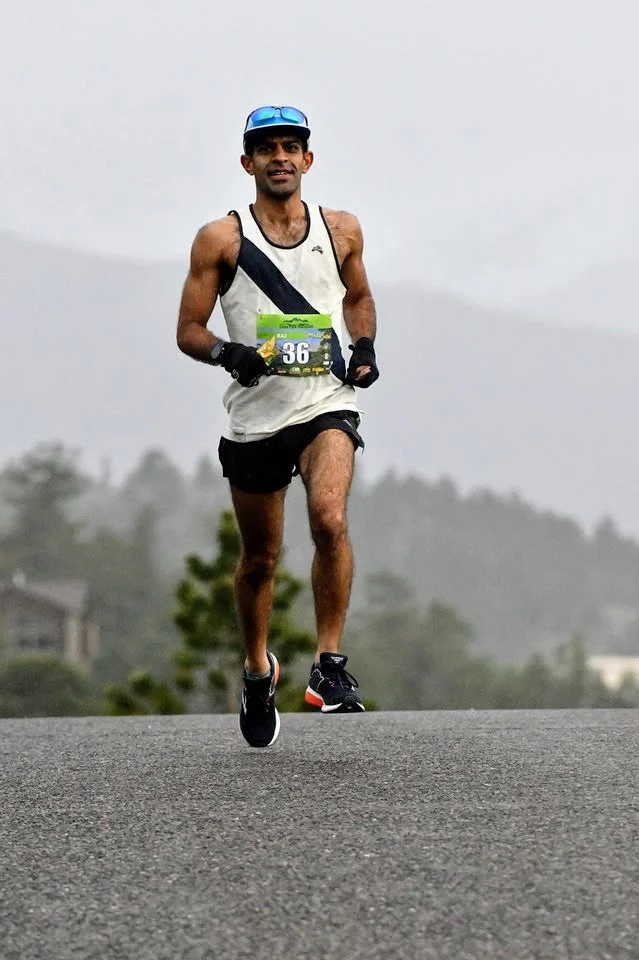This past weekend, I traveled to Colorado to run a marathon in Rocky Mountain National Park, which started at 9,134 feet! The first 10k of the race was downhill, dropping to just below 8k feet before climbing back up and leveling out. Not having spent much time at high altitude and being afraid of heights made me somewhat anxious. Would I get altitude sickness, pass out, and be gobbled up by a bear? Or would I trip on the trail and tumble down a cliff into the abyss?
High altitude is considered to be above 8k even though lower altitudes can still cause us to feel lightheaded, have a higher average heart rate, and compromise performance. For every 1k feet in elevation, you experience a loss of about 3% in oxygen molecules per breath, or almost 25% oxygen loss for 8k feet of altitude. In February I ran a marathon in Utah that started around 5k feet and immediately felt myself short of breath, working significantly harder to average a 6:45 minute/mile pace.
At elevation, air pressure is reduced so every breath you take has less oxygen compared to sea level. As a result, your body has to produce more red blood cells that carry oxygen to your muscles. And because the body is making more red blood cells, it increases the volume of plasma (the non-cell part of blood) so the blood doesn't get too thick. Your body works harder to do basic things like breathe, think, walk...not to mention run!
To run effectively at altitude, you should make adjustments in particular to your training, nutrition, and goals.
Training
The best way to prepare for altitude is simply to train at altitude. For many of us, that is difficult to do without taking a bus, flight, or jet pack to high elevation areas. More interval and hill training will help expand your aerobic capacity and heat training will help your body get used to a similar plasma-building process - though without the extra red blood cell production. These techniques will give you strength at higher rates of perceived exertion (RPE) at altitude.
Two devices I have incorporated into my training are a high-altitude chamber that decreases air pressure and oxygen and a portable altitude mask that filters oxygen out of the air as you breathe. While these are helpful at simulating altitude, they still can't beat exposure to the actual conditions. Give yourself 4+ days before a race to acclimate and let your body produce more red blood cells. For my Colorado marathon, I unfortunately did not have that luxury and landed at 10pm the night before - don't try that at home! However, for what it's worth, some coaches do advise arriving as close to the start for a high altitude race to prevent the onset of acute mountain sickness (AMS) that typically starts within 24 hours at elevation with symptoms beginning as soon as 6 hours after arrival.
Nutrition
Your body needs to have a higher level of carbohydrates, hydration, and iron stores to perform at altitude. Carbs need less oxygen than protein to metabolize in your system and provide sufficient energy for a long distance race. It's also very easy to become dehydrated because you breathe out more quickly and lose water through respiration. With the air drier and humidity lower, sweat evaporates faster, not triggering your normal urge to hydrate. Be aware that your body at altitude is more sensitive to diuretics like caffeine with lower levels of oxygen and body moisture. Finally, your body benefits from iron to create red blood cells. Eat iron-rich foods such as greens and lean red meat!
Goals
You need to prepare yourself mentally that running at altitude will be harder and demand a higher RPE. That mental strength will allow your body to expand its limits in tougher conditions; nevertheless, you should manage your expectations and adjust your sea-level goals. Run by effort rather than your typical paces. Next month, my friend and I will be taking on another high altitude marathon in Madison, Montana, which is apparently the "highest road marathon on planet earth." It starts at 9.2k feet and within a few miles peaks at 9.6k feet before leveling off to finish at 8.6k, with an average of 9k+ altitude. I will be approaching it with a little more confidence and preparation and a little less anxiety and fear! I still hope to encounter a bear.



